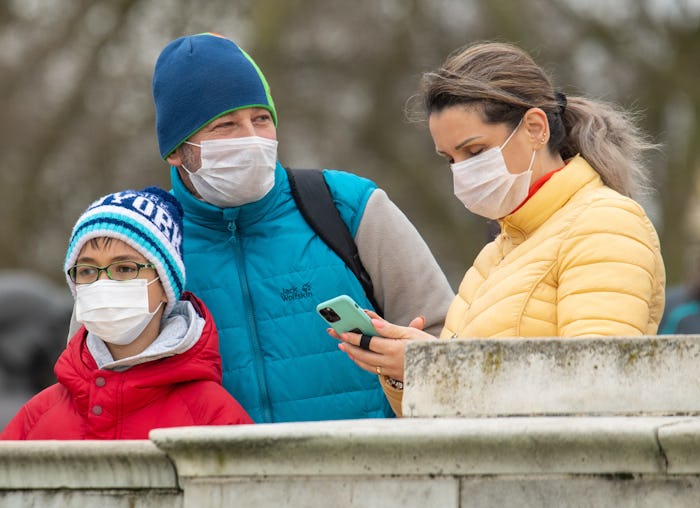Life

Does Everybody Have To Stay Inside During A Quarantine? (Even Your Kids?)
Quarantine. Right now it sounds like a four letter word. The daily reports about the spread of coronavirus have many worried that a quarantine — be it for infected families or a nationally instituted response — could have us all on lockdown very soon. And for parents, even the most responsible among us, the thought of having kids at home indefinitely is bewildering. How will you entertain them? Who will teach them their lessons? For the love of all that's holy, can you go outside in a quarantine?
That last question has people especially confused. With everyone talking about social distancing, a term The Atlantic described as “a conscious effort to reduce close contact between people and hopefully stymie community transmission of the virus,” parents are perplexed. Does that mean my kid can’t go out and play?
In Italy, where this week 200 people died in 24 hours, per NBC News, the answer to that question right now is yes, stay indoors or face fines up to 206 euros (or potentially up to three months in prison!). As of Wednesday, March 10, the Italian government asked residents to “stay indoors unless they have an urgent need to go out, such as for work or a medical appointment, or to buy food,” The Local reported.
Meanwhile, in the United States, schools are closing, events are being canceled, and sports are on hold, but we haven’t reached nationally enforced quarantine yet. For those who are choosing to self-isolate however, doctors do have some advice about whether or not to head into the great outdoors.
“Go outside in your yard if no one’s there,” says Dr. Michael G. Schmidt, Professor and Vice Chairman of Microbiology and Immunology at The Medical University of South Carolina. “What are you going to contaminate, the trees?”
But, he adds, it’s important to use common sense. "In Italy it’s because of the density of the population. In the U.S., however, most of us live in single family residences.”
What about those families that live in apartments? Dr. Schmidt says families can always go out on their balconies or in a courtyard provided they aren’t around other people there.
“The purpose of quarantine is to prevent transmission of COVID-19 from a person who might be developing the disease to others who are uninfected. Quarantined individuals should not have contact with other people,” adds Dr. Elizabeth Burnett, Professor of Pediatrics at Boston University School of Medicine. “Going outside is permissible, as long as it does not result in coming into contact with other people. So children can play outside, alone, in the backyard, as long as they are feeling well enough to do so.”
That said, she adds that kids who are quarantined should not enter public areas, or places where they could come into contact with others. “This would include shopping, public playgrounds, libraries, places of worship, playdates with other quarantined children, public transportation, etc.," Dr. Burnett says. "Quarantined children should not play with other quarantined children and even siblings should avoid excessive close contact, especially if someone in the household has an underlying illness."
Bottom line: Use caution and be responsible. If you have to make a grocery run with a quarantined kid at home, consider using an online delivery service.
On the other hand, if your child just needs get some sunshine, take advantage of your backyard, and let them get some fresh air while they can. For now, we're not under any official quarantine. Whether or not that'll change in the coming weeks remains to be seen.
If you think you’re showing symptoms of coronavirus, which include fever, shortness of breath, and cough, call your doctor before going to get tested. If you’re anxious about the virus’s spread in your community, visit the CDC for up-to-date information and resources, or seek out mental health support. You can find all of Romper’s parents + coronavirus coverage here, and Bustle’s constantly updated, general “what to know about coronavirus” here.
Experts
Dr. Michael G. Schmidt, Ph.D., Professor of Microbiology and Immunology at Medical University of South Carolina
Dr. Elizabeth Barnett, M.D., Professor of Pediatrics at Boston University School of Medicine
This article was originally published on